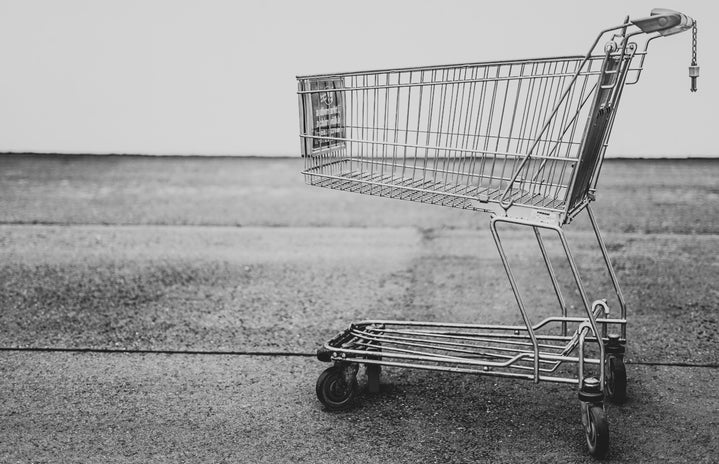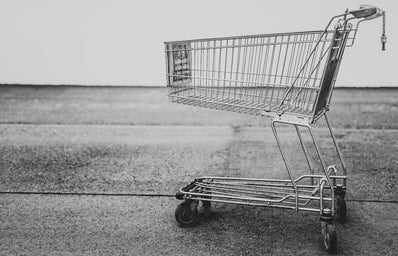Welcome back to a new semester, ladies and gents, girls and gays. It’s been a loooooooong two months (though not quite long enough, in my opinion). My favorite winter break activity has been snooping through the Instagram accounts of friends and acquaintances and learning what they’ve been up to — watching endless Christmas movies, getting engaged, never leaving the house and building Minecraft worlds, landing internships, even traveling internationally during a pandemic (uh oh). College kids really do be all over the place, man.
I, for one, have had the least exciting new life development: working retail. I got a temporary gig as a door monitor at a local grocery store, and let me tell you, it is an experience. It pays well, and it’s not much work — all I do is sanitize shopping carts, count the amount of customers in the store, and enforce LA County mask rules. Sounds easy, right? Well it is… until you interact with a bad customer and it ruins your day. (Some people really don’t like to wear masks, my friends!) Because the job requires me to stand outside of the store for hours on end, I have a lot of time to think about the interactions I have with customers. And because I am The Way That I Am™, I started to think about what these interactions mean about the nature of humankind.
Is man inherently good or evil? Philosophers have been asking this question for ages. 17th-century English thinker Thomas Hobbes famously wrote that life is “nasty, brutish, and short,” believing that people are naturally selfish and will fight each other over limited resources — be it over money, fame, or a space in line at my local limited-capacity grocery store. (Thanks, LA County District Supervisor, for making this somehow my problem.)
On the other hand, French Enlightenment philosopher Jean-Jaques Rousseau believed that humans are inherently good and capable of living peaceful and self-fulfilled lives. It’s not all sunshine and rainbows, however: Rousseau claims that the onset of agriculture and industry led to unprecedented levels of private ownership, which led to extreme economic inequality. This inequality forced good-natured humans to compete with each other for status and power, which gives the appearance that mankind is evil, and has been since societies developed. (You can learn more about Hobbes and Rousseau by reading this helpful article by Professor Robin Douglass.)
Although the two philosophers disagree on man’s nature at birth, they both agree that life is… messy. They believe good morals are required to navigate life’s messes and function normally in any modern society. In my time working retail over the last two months, I have tried to determine whether or not most customers are capable of functioning normally in modern society. Are people good at being people? The answer for each individual is determined by something that may seem small and unexpected: their treatment of shopping carts.
I got this idea from a meme I saw, and I couldn’t get it out of my head. The text of the meme reads as follows:
To return the shopping cart is an easy, convenient task and one which we all recognize as the appropriate, correct thing to do. To return the shopping cart is objectively right. There are no situations other than dire emergencies in which a person is not able to return their cart. Simultaneously, it is not illegal to abandon your cart. Therefore the shopping cart presents itself as the apex example of whether or not a person will do what is right without being forced to do it. No one will punish you for not returning the shopping cart… you gain nothing by returning the shopping cart. You must return the shopping cart out of the goodness of your own heart… A person who is unable to do this is no better than an animal, an absolute savage who can only be made to do what is right by threatening them with a law and the force that stands behind it.
Pretty dramatic for a meme, right? The more I thought about it, the more true it seemed. Does the individual accept their duty to return the shopping cart to the cart corral, knowing he or she will gain nothing from doing so? I even made a graphic representing my modifications to the idea presented in the meme:

So yeah… you could say that the general public has frustrated me over the last two months. But as silly as it is, I think shopping cart theory scratches the surface of something deeper. Why are my grocery store customers so reluctant to inconvenience themselves even a little bit for the greater good? Retail workers like me usually write this behavior off because we expect customers to be frustrating. But here’s the catch… customers are PEOPLE. And if there’s anything we’ve learned about people over the last 10 months, it’s that hardly any of us are willing to sacrifice our own self-interest for the greater good. Why do you think we’re all still stuck at home?
But there is hope, my friends. Why? Because some people do return the shopping cart. Some people genuinely do hope that I have a nice day, and are thankful that I wash the carts for them. And I am thankful for these people, too.
There will always be evil in the world; there’s no doubt about it. But the best thing we can do to combat it is to try to be good: to wear a mask for others, to keep that angry comment to yourself on social media, to return the shopping cart. And hopefully, our good example can help others learn to treat us with the same respect we try to give them.
But even if it doesn’t, we do good anyway. Why? Because doing good is… good. An end unto itself. (Go SparkNote some Kant, my friends. Or watch The Good Place, it’s easier.) And the more good we do, the better our world becomes.



